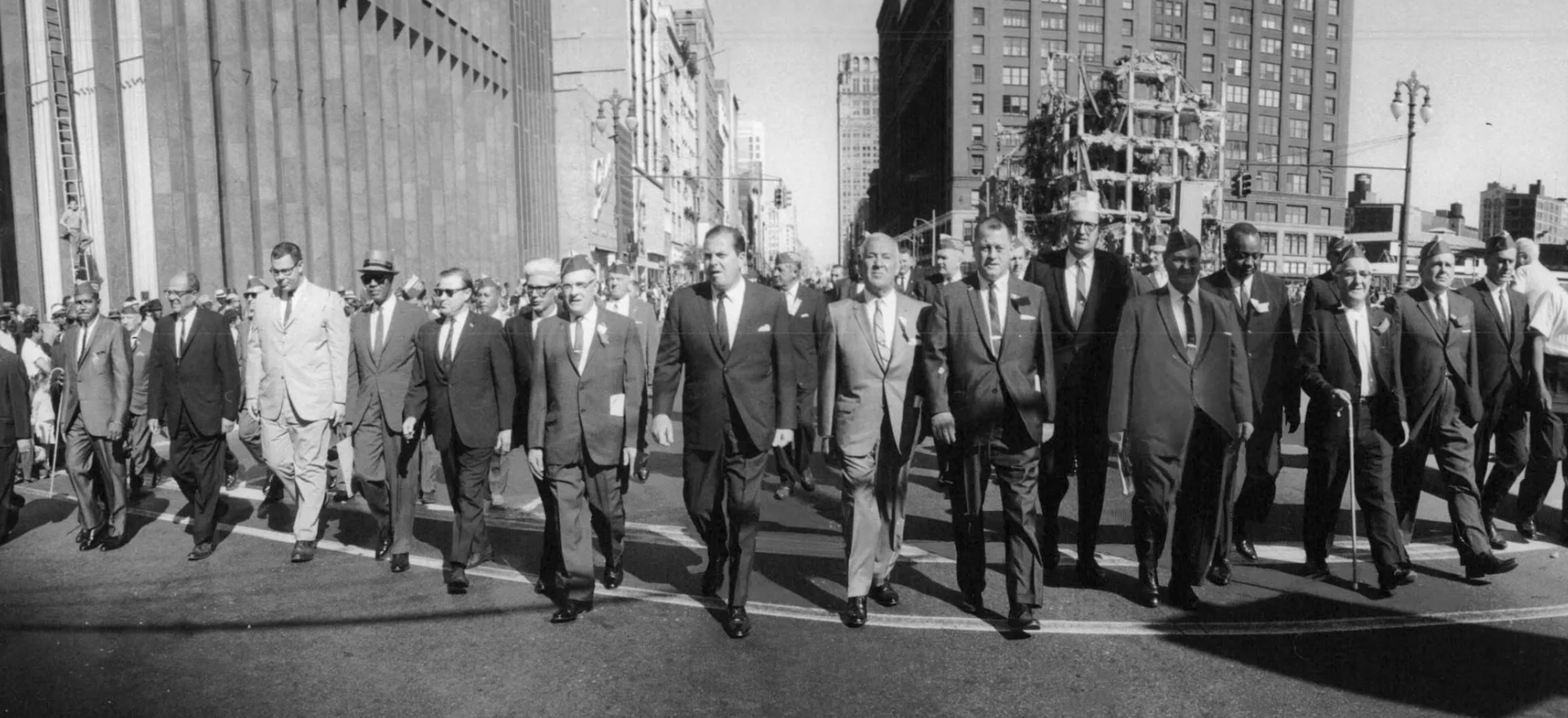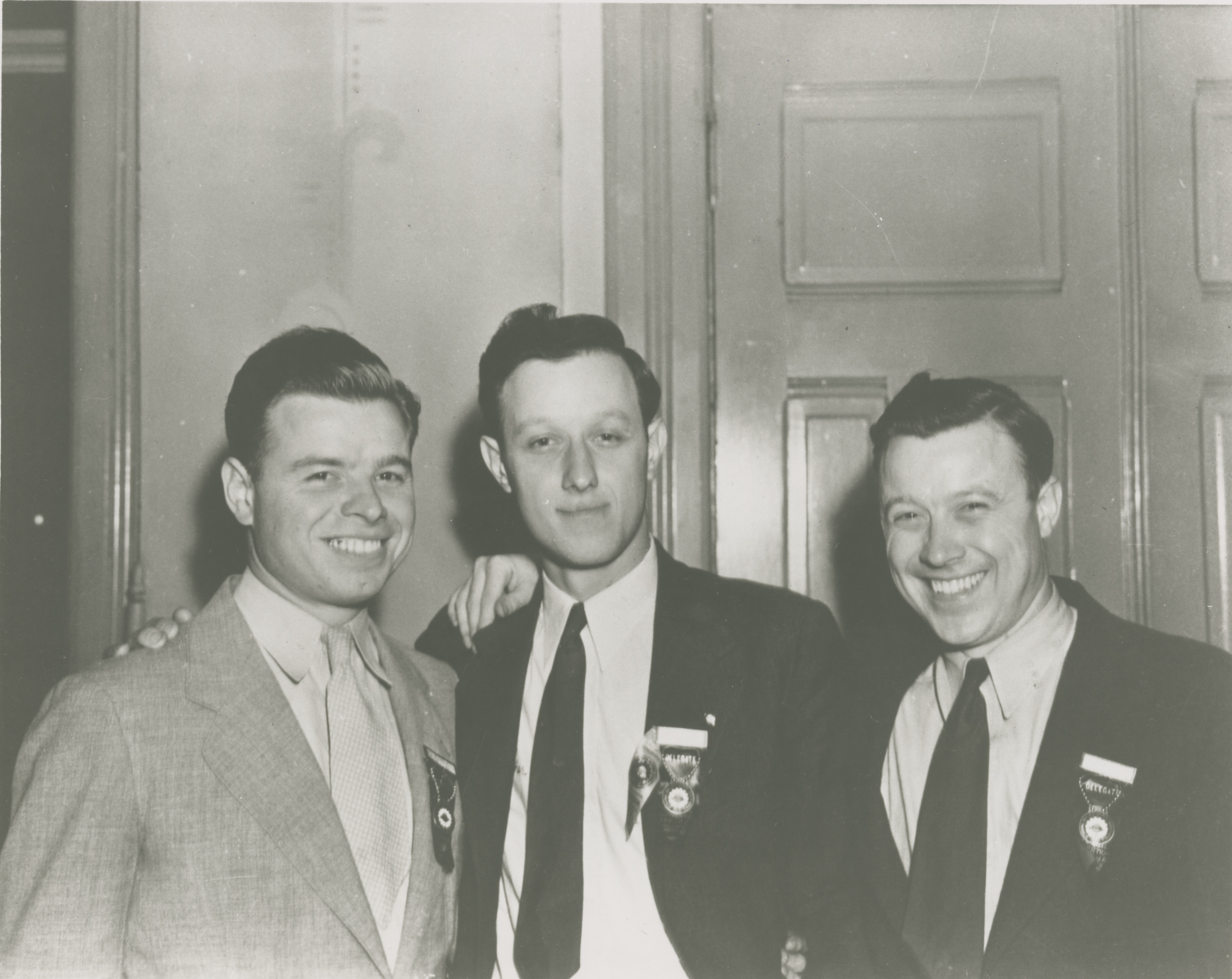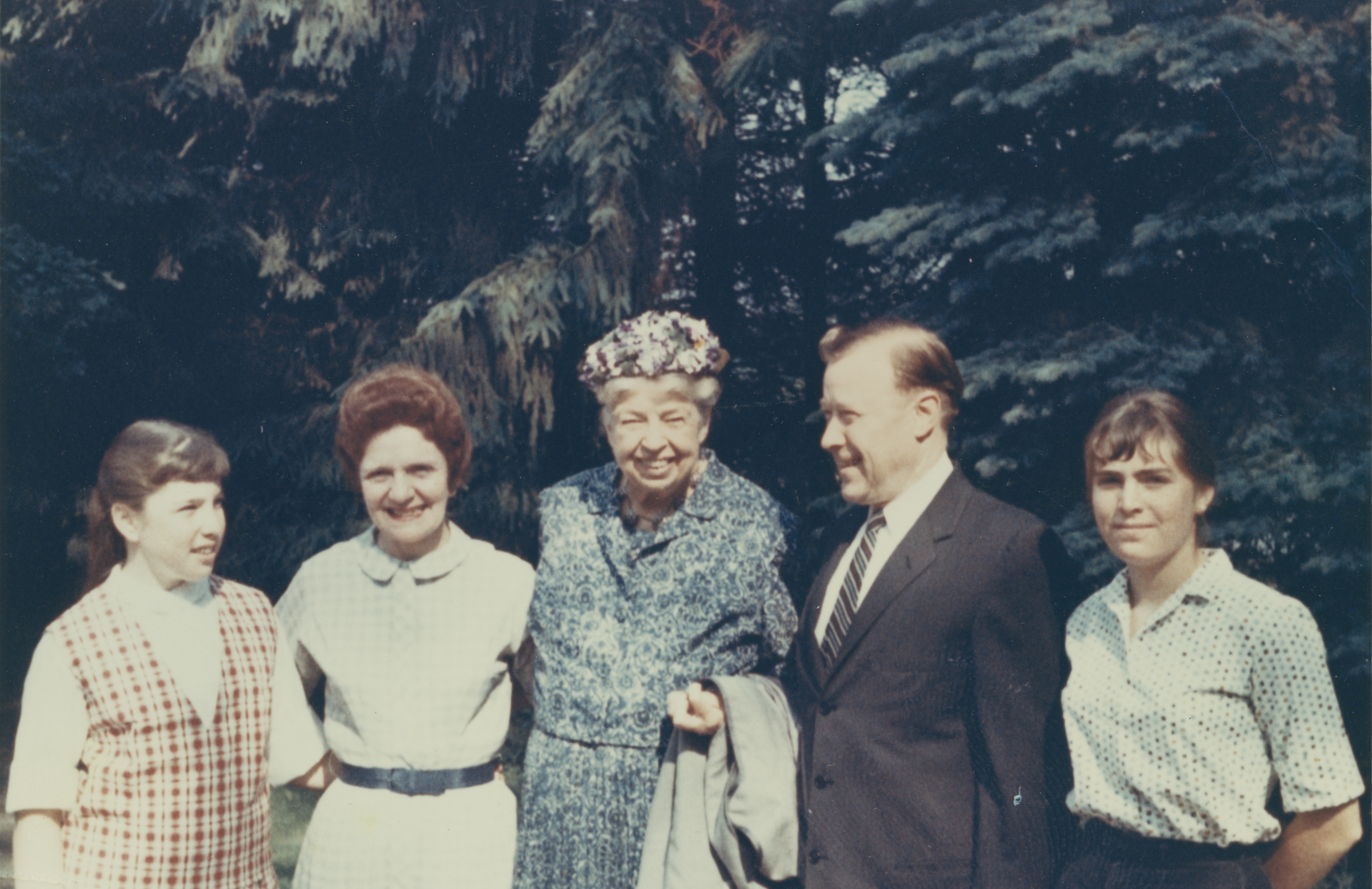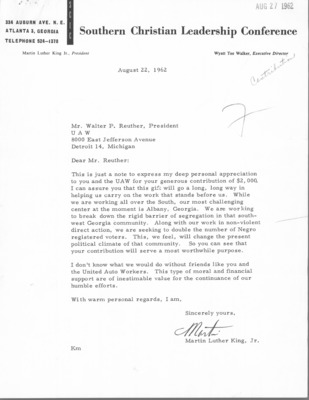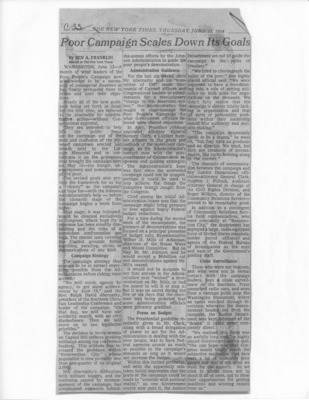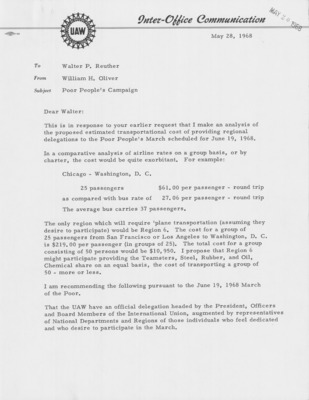United Automobile Worker
Item
- Title
- Date
- Alternative Title
- extracted text
-
United Automobile Worker
-
1949-06-01
-
Vol. 13 No. 6
-
—
PPI
VOL,
13, NO. 6
ty
JUNE,
1949
LET a
$200,000 Reward Is
Offered by Union for
Would-be Killers of
Walter & Vic Reuther
Page
‘At right are the UAW
leaders,
Two
both shot in
their homes by an unknown assailant. Since this
picture was made, Walter Reuther’s arm was crip-
pled and Victor Reuther’s eye was shot out.
The
shootings followed the same pattern, and were just
13 months apart.
CIO BOARD MOVES AGAINST COMMIES
Page
Five
FORD
STRIKE
IS SETTLED;
CONTRACT NEGOTIATIONS OPEN
Page
Three
th
Wii
yp
Y
Local
600 members
liné up to vote ratification of the strike settlement,
voted approva)] unanimously,
Local 900 had earlier
The River Rouge parking lot, empty
strike, has again filled with cars (above),
(below)
during
—Acme
photos
the
June, 1949
Text of UAW Statement
on Strike Settlement:
We are happy to announce the consummation of an
agreement which represents a fair settlement of the issues
out of which the strike grew.
Six of the seven points of the Union’s May 21st proposal
have been satisfactorily resolved and have been incorporated in the strike settlement agreement signed today, The
seventh point will be handled through arbitration.
The strike settlement provides:
1.
Above, more
parade past the
than 6,000 members
River Rouge plant.
—Acme
of Ford Local 600 Oe
The marchers were
led by President Walter Reuther, Local
Thomas W. Thompson, Regional Director
and Ford Department Director Ken Bannon,
600 President
Joe McCusker
Below, the picket line hours passed quickly
variety of entertainment on hand at all times.
with
a
Photos,
a
HUMAN
ENGINEERING
There
was
no
speed-up
at
Ford’s
because,
said
Marshall
Beaman,
company
spokesman,
“Nobody’s dropped dead yet.”
Asked UAW spokesman Jack
Conway, “Is that your yardstick
for determining the health and
safety of the workers?”
More
Die Casters
Vote for UAW-CIO
TOLEDO—Workers
Die
Casting
die
casting
CIO in
to 156
4,000
the
for
Corp.,
group
last
the
second
to
more
major
re-enter
the
month, voted 361
UAW-CIO.
Over
Doehler-Jarvis
withdrew
in theSchultz
than
workers,
a
year
who
ago
from the Mine, Mill and Smelter
Workers with the Schultz die casters, voted overwhelmingly to enter
the UAW-CIO last month.
Leaders in the Schultz die cast
organizational
drive were
Walter
Gilmore,
Richard
Morehead,
Eck
Gray and William Huff, in addition
to Ernest Love and Al Grenakis,
UAW
International representative.
Charles Ballard, director of Region
2B, and Ken Eckert, co-chairman
of the Die Cast Department, were
in charge of the Schultz drive.
Tr
a
CONSTANT LINE SPEEDS WITH UNIFORM
FLOW OF WORK
The Company will maintain each line at a constant
speed and will space units to provide a uniform flow
of work.
MIX OF BODY TYPES
Workers will not be required to do additional work
when the change in mix of body types increases the
work load.
RELIEF
Relief men will be designated and will be available
at all times to insure the employes adequate relief.
ABSENTEEISM
The normal amount of work required of employes
shall not be increased because of absenteeism.
ADJUSTMENT
ASSIGNMENT
OF
MAN
POWER
AND
WORK
Management will take prompt steps to review those
jobs on the line which the Union claims are tight,
and adjustments will be made where necessary.
DISCHARGE CASES
The 27 cases of discharges and disciplinary layoffs
have been rescinded.
The Union and the Company have agreed to practical
arbitration machinery which will facilitate the early settlement of the one issue not resolved in the agreement.
This is the question to be submitted to arbitration:
“Does the company under the contract, on the basis of
health and safety or otherwise, have the right to require
an employe to perform his work assignment on any unit
in less time than the company’s time study shows for his
assignment,
provided
the
than 480 minutes of work
an eight-hour shift?’’
employe
is not
as measured
assigned
more
by time study in
We believe that both parties have made a contribution
that will make for greater stability and understanding in
our relationship, and which will minimize future disputes
in the area out of which the current strike grew.
The Union regrets that it was not possible to get the
Company to agree to the points contained in the strike
settlement without the necessity of strike action on the
part of thousands of workers.
‘
Ford workers in both the Rouge and Lincoln plants are
to be congratulated on their remarkable solidarity and
exemplary conduct of the strike.
*
eee
—Acme
Photo.
With a model of the Ford assembly line before him, Walter Reuther (left), explains how
the speed-up worked. Tom Riley (center), Chairman of the B Building, where the speedup existed, puts a model into place. At right, Secretary-Treasurer Emil Mazey looks on.
UNITED
Page 10 -
AUTOMOBILE
WORKER
June, 1949 -
Another UAW Radio Station —
Get Out the Ear-Plugs
FCC Yields to Pressure;
Goes on the Air This Month
Reverses ‘Opinion’ Ruling |
UAW-CIO Radio Station WCUO,
Cleveland, Ohio, will begin testing
broadcasts June 15, with formal
opening
29.
WASHINGTON—The Federal Communications Commission
affirmative duty generally to enhas given in to the demand of the radio business that station courage and implement the broadowners and networks be allowed to use the air to impose their cast of all sides of controversial
opinions on the listening public. This decision reverses the public issues over their facilities,”
stand taken by the Commission eight years ago in the so-called BELLOWS AND BELCHES
What this ought to mean is, for
Mayflower case when it denied the right of station owners to
pump their own views over the airways. Frieda Hennock, FCC’s example, that when a network
makes money out of broadcasting
—
only woman member, dissented.¢—— oH
radio
Any
listener
knows,
of
is bitbroadcasting
that
course,
terly biased against every liberal
decision
Mayflower
The
cause.
didn’t bother this biased use of the
Stations hire or provide
airways.
time for newscasters and commentators who express their viewpoint
and slant the news to please their
The issue before the
advertisers.
Commission was whether to clean
it
up this situation or to make
worse
by
turning
the
station
own-
ers loose on the listening public.
the
opposed
vigorously
Labor
station owners’ demands in hearlast
the Commission
ings before
year. It protested the big-business
anti-labor slant of present broad-
easts and insisted that the Commission
clean
up
this
situation
rather than add to it by letting the
stations add their own
voices to
those of their paid stooges.
In yielding to the industry’s demand, the Commission read a long
lecture on stations owners’ responsibility to give their listeners all
points
of
view
on
controversial
public issues.
This means, it said,
not
only
that
they
should
make
time available on demand
to opposing
points
of view,
but
that
Stations
and
networks
“have
an
Worker Is Tossed on the Industrial
Serap-Heap with a “Pat on the Back”
“T really don’t know what I’ll do to take care of myself
physically or financially,’’ was the tragic comment of Walter
MeWilliams, 66-year-old Budd worker in Philadelphia. His retirement story appeared last month in Local 813 Budd News,
under the title ‘‘Pensions or a Pat on the Back.’’
Winter . worked at. Budd's 10K ol. qanaiaaniaaisiSaan
ee
years. Last month he handed in his
UAW-CIO card after his boss found
him
“too
old
to work,
and
too
young to die.”
ing me constantly in debt.
The
funny part of it is that I had more
money when I started to work at
Budd’s 31 years ago than I have
now.
Of course, that’s not saying
much,
because
now
I have
no
money.
PRAYS FOR PENSIONS
“I pray you boys are successful
in securing
2a Pension
Plan
for
“Several years ago, because
of
Budd
workers,”
McWilliams
told
the officers of his union.
“I hope this unsteady employment I lost a
the other fellows in the plant won’t little house that I owned,’ relates
find themselves in my predicament. McWilliams. “I gave my life to the
and when [I quit
“When
I first went to work at |Budd Company
Budd’s,” he tells, “I was in perfect the other day, I received many
health and
weighed
185 pounds. slaps on the back from the ComWhen I was forced to quit Budd’s pany officials for my years of faith31 years later, I weighed 135 pounds ful service.
and no longer have the strength PATTED, THEN KICKED
to support myself.”
“T realized that the slaps on the
Because of hay fever and his age back would not take care of me in
MeWilliams says, “I lost a lot of my old age, so I jokingly (although
time from work
in the last four in my heart I meant it) stated to
years.
It got so I just could not the group of officials: ‘It would be
stand the gaff. The time I lost due nice if I could get a pension from
to this minor illness lowered my
the Budd Company.’ ”
yearly earnings.
It will affect any
The reply to this one, from the
benefits I may receive from Social plant superintendent
was, “Budd,
Security.
I will receive the magJr., does not believe in pensions.”
nificent sum of approximately $36.But Budd, Jr., and the top direc00 per month from social security. tors make enough in a year to live
a comfortable retirement.
During
COULDN’T SAVE
1948, Budd, Jr., got the handsome
money
any
not save
“IT could
while working at Budd's as there sum of $100,000.08, while the rest
were many years in which we were
of his executives divided $445,121.57
Jaid off for months at a time keep- among themselves.
ceremonies
to be held June
President
Walter
Reuther
will
participate in the ceremonies.
Invitations have been sent to all
local unions in Cleveland, Akron
and Lorain County.
The picture shows the station's
construction nearing completion.
the bellowings of a Fulton Lewis
or the belches of a Henry Taylor
it must also pay for commenta-
tors who care about the interests
of the people and whose opinions
on public issues are not for sale.
The
Commission’s
fine
words,
however,
will not
clean
up
the
broadcast
channels.
While
the
Commission
imposes
conditions
upon the right it has now given
station owners to air their views,
these
gentry
know
that
sion,
however,
will
bring
the
Com-
mission has no effective means of
making those conditiions stick. The
only power it possesses is to refuse
to renew a station’s license when
it expires.
Common
sense
indicates, and experience proves, that
station
operators
can
go
far in
slanting their treatment of public
issues
before
the
Commission
would
dare
impose
this
death
sentence.
Commissioner Hennock deserves
high public praise for her dissenting opinion which bluntly debunks
the “conditions” prescribed in the
majority decision.
“I agree,”
she said, “with the
majority that it is imperative that
a high standard of impartiality in
the presentation of issues of public controversy be maintained
by
broadcast licensees.
I do not believe that the Commission’s deciabout
the
desired result.”
The Commission’s
prescription
of
fairness,
she
pointed
out, “is virtually
impossible of enforcement by the Commission with our present lack of
policing
methods
and
with
the
sanctions given us by law. ...In
the
absence
of some
method
of
policing and enforcing the requirement that the public trust granted
a licensee be exercised in an impartial manner, it seems foolhardy
to permit editorializing by licensees
themselves.”
While
networks
and_
station
owners will probably pay little attention to the Commission’s lecture
about playing fair on public issues,
the listening public is given something to shoot for.
The Commission states that licensees are obligated to give all sides on public
issues, yet undoubtedly it will con-
tinue to renew licenses of network
and affiliated stations which regularly peddle the big-business line
and
spread
their lies about
organized labor.
WDET-FM Program Schedule for June
101.9
NEWS
Megacycles
AND
On
On
Your
FM
Dial
Channel
WEATHER FORECAST EVERY
ON THE HALF-HOUR
270
HOUR
the air 8 to 10 p. m. Monday through Friday
8 a. m. to 10 p. m. Saturday and Sunday
SUNDAY
Organ Classics
Radio Chapel
Cosmopolitan Program
(In Italian)
Cosmopolitan Program
(In Polish)
Cosmopolitan Program
(In Jewish)
Around the Town
String Classics
News Roundup
Yesterdays
Music We Love
Community
Clinie—Discussions on inequalities
of opportunity
Opera Matinee
Gilbert & Sullivan
Music for America
MONDAY
4:30
5:00
Great Books Discussion
Lest We Forget These
Great Americans
You and Your City—
George Edwards
Choral Concert
Sports Roundup
Keyboard Masters—
Sponsored by Smiley
Brothers
Labor Views the News—
Guy Nunn of UAW
Washington Correspondent
Footlight Parade
Operation UN
Detroit Public Library
Symphony
THROUGH
Cosmopolitan Program
(In Polish)
Cosmopolitan Program
(In Italian)
US Armed Forces Programs
A Woman’s World
Music from the Movies
Around the Town
Story Time
Rhythm from Radio
Place
The Vocal Touch
5:45
6:00
6:30
745
:00
FRIDAY
Sports Roundup
Dinner Music
Labor Views the News—
‘Guy Nunn of UAW
A Tapestry in Melody
Music You Want
Invitation to the Waltz
Detroit Public Library
Symphony
Gay White Way
News Roundup
America Sings
SATURDAY
Tic Toc Tunes
Americana
Rhythm and Reason
US Navy Band
Young Americans Look
at Books
Spotlite on Song
Luncheon Serenade
Yesterdays
Marine Story
¢
You and Your Health—
Det. Dept. of Health
Let’s Listen to Some
Records
Understanding Music
U of M Band Rehearsal
Melodic Strings
Brother McWilliams regretfully accepts his withdrawal card from Local 813 SecretaryTreasurer Howard Byrne.
4:00
4:30
4:55
5:00
5:45
9:00
9:45
Piano Patterns
Tropicana
Around the Town
Collector’s Corner
Sports Roundup
Dinner Music
Labor Views the News—
Guy Nunn of UAW
A Tapestry in Melody
All Time Favorites
Invitation to the Waltz
AFL Report from
Washington
Detroit Public Library
Symphony
Proudly
(Clip and Save)
America
We
Hail
Sings
Owned and operated by
THE MEMBERSHIP OF THE
UAW -CI0
~ FOR ALL THE PEOPLE—
TRUTHIN THE NEWS
°° MUSIC AND ENTERTAINMENT
° © FOREIGN LANGUAGE PROGRAMS
*** EDUCATIONAL FEATURES
Y\
KASS
OS
eee
Channel 270
Page 12
UNITED
AUTOMOBILE
WORKER
* June, 1949
Foundry Council's Work Rewarded
As Burke Introduces Safety Bill
WASHINGTON—A bill to cut down the more than 11,000
deaths and two million lost-time injuries sustained by American
workers annually has just been introduced in the House by
Representative Tom Burke (D., Q.), a charter member of Local
12, Toledo, Ohio.
The
bill would
for
the
first
time
set up uniform federal standards
of health and safety in all hazardous occupations except agriculture.
Enforcement would be put in the
hands of the U. S. Secretary
of
Labor.
A new division would be
set up to handle the formulating of
codes and their enforcement. However, to avoid duplication, the Secretary of Labor would be authorized to make agreements with State
Labor Departments whereby they
would
undertake
enforcement
of
the federal
codes
under
federal
standards for such enforcement.
Introduction
of the
bill follows
more than two years of work by
the UAW-CIO
Foundry Council.
Originally, a bill was drafted covering foundry operations only. It
was
found
that,
while
work is very hazardous,
foundry
in terms
of fatal
accidents
and
serious
lost-time injuries, other occupations and
industries have
even
higher accident frequency rates.
It was then recommended
that
the bill cover all hazardous industries,
defined
dent
as
such
those
frequency
the average
ing.
for
industries
having
rate
all
being
an
acci-
higher
than
manufactur-
Three Internationals
Join Co-op Council
Applications of the United Packinghouse Workers,
International
Association
of Machinists
and
Brotherhood of Sleeping Car Porters (Auxiliary) for membership in
the Council for Cooperative
Development
were
approved
at its
Executive
Committee
meeting
in
Cleveland on May 15. This brings
membership in the Council to six
International Unions and four Regional and National Cooperative
groups. The unions, already members, include the UAW-CIO, United
Rubber Workers, and the State,
County
and
Municipal
Workers,
ALF.
Cooperatives
are:
Central
States Cooperatives, Chicago; Eastern States Cooperatives, New York;
Associated Cooperatives in California and the Cooperative League of
the USA.
The Council for Cooperative Development was set up in February
of 1948 for the purpose of uniting
labor and cooperative groups in the
work of organizing cooperatives in
the industrial centers of the U. S.
During the past year, chief emphasis of the Council has been in Eastern Michigan.
Six cooperatives in
Detroit, Dearborn,
Lansing,
Flint
and Pontiac, are now working together as a chain with an annual
volume
of just under
$1,500,000.
Plans call for completing organization
work
in Toledo,
Jackson,
Wayne,
Lansing, Saginaw, Dearborn and west-side Detroit within
the next year.
Representative Burke announced
his intention to introduce such a
bill in the course of the Cleveland
meeting of the UAW-CIO Foundry
Council, May 28, where he was a
featured speaker.
In addition tothe bill, Representative Burke proposed a House Labor Committee investigation of the
related subject of Workmen’s Com- tion in some states as in others.
pensation, which is now a patch- | Details of this important bill and
work job giving workers or their the need for it will be given in
survivors half as much compensa- the July Auto Worker.
Children Have Dance Festival
Four years ago the skeptics said
it was just a passing fad, but on
Sunday,
National Golf
Tournament Is
In the Works
Do
you
favor
holding
tional CIO golf championship?
Last year’s Michigan champ,
Will your local union back a
national tournament by enter- John Naglick, Local 600.
ing team and individual play-
These
were
two
big questions
which were popped this month at
recreation leaders in all UAW-CIO
locals.
The answers received will
determine whether
or not the
UAW-CIO
International Recreation Department will start machinery
going
to run
the
big
links
event.
So
successful
have
state
and
regional
UAW
and CIO competi-
tions
been,
many
of the
mashie
swingers have been
asking
for
shots at national titles. Guarantee
of participation is first necessary
before the International Recreation
Department can set dates or con-
tract
for a golf course.
The
tour-
nament, if held, will probably be
somewhere in the Midwest in August
or
September,
according
to
Recreation
Director
Olga M.
Madar.
The championship would be 36hole medal play, over a week-end,
with flights for players
of all
handicaps.
Prizes would be guar-
anteed by the Recreation Department.
Recreation
chairmen.
or
golf
captains are urged to write immediately to the UAW-CIO Recreation
Department, -5707 Second, Detroit
2, Michigan, stating whether or not
they want. the tournament, if they
will enter golfers in it, where they
prefer it to be held, and their
choice of dates,
5, at Detroit’s
157 hall 140 youngsters proved
a na-
ers?
June
CO-OP INSTITUTE
The
Sixth
Annual
Labor
and
Co-op Institute will be~held August 14-21 at the School for Workers, University of Wisconsin, Madison, Wisc.
UAW
members who attended
these institutes are now giving
leadership
to labor’s program
of
developing consumer co-ops in the
cities.
The institute. course includes:
What labor is doing in the field
of
cooperatives;
Why
in
labor
co-ops;
should
be
interested
How to organize and get going;
The economic base for organized
consumer action;
The institute is sponsored by the
Co-operative League U. S. A., Rochdale Institute, Council for Co-operative Development and member international unions.
For further information,
write
to: Co-op Division, UAW-CIO Edu-
cation Department,
ren, Detroit.
28
West
War-
ATLANTA GM VOTE
GM
Buick
Division workers
in
Atlanta voted May
11 for repre-
sentation by the UAW, it was announced
by Region
8 Director
Thomas J. Starling. The vote was
18 to 2,
Local
that
dance is definitely in the UAW recreation
program
to
stay.
The
clinching evidence was the Fourth
Annual Children’s Dance Festival,
sponsored by the Greater Detroit
CIO Recreation Council.
A committee of union mothers, chaired
by Mrs. Dorothy Chisholm, handled
details of the event.
The varied program featured 27
different dances with boys and girls
from 5 to 14 participating under
the direction of creative dance instructor
Fanny
Aronson
and
tap
teacher
Howard
Hultberg.
Both
Miss
Aronson
and
Mr.
Hultberg
worked
with
the young
dancers
weekly during the past winter in
classes organized by the UAW-CIO
International Recreation Department, and held at the halls of Lo-
cals 49, 174, 490 and 212.
Little dancers demonstrated remarkable skill in execution of tap
steps, and amazed the audience of
500
with
original
interpretations
in creative dance.
Featured dancers from the creative groups included
Carole
Anne
Horning
in
“How
High
the
Moon,”
Sharon
Jeffrey and Joel Carliner in ‘Leprechaun’s Dance,’”’ Carol Wetsman
in “The Tree and the Storm,” and
Rima
Granoof
presenting
her
“Ghost
Dance.”
Modern
dance
groups presented ambitious dramatizations
of “The
Adventures
of
Pinnochio,” “By the Fireside,” and
“La Ollanta, a Legend from Peru.”
Nine
other
dances
were
shown
by
Miss Aronson’s proteges of Local
49's classes.
The children’s dance committee
members in addition to Chairman
Dorothy Chisholm were: Mrs. Leena Fenton, Local 212; Mrs. Ann
Pascuzzi, Local 490; Mrs. Ann Concilla, Local 174; and Mrs. Laura
Sorenson, Mrs. Betty Horning, Mrs.
Eve Mesh, and Mrs. S. Hibbeln, all
of Local 49,
Assisting the dance
group was a special festival committee of 23 mothers.
7
4
LETS KEEP THAT DOOR OPEN
%
“s
Installation of officers of Chrysler-Highland Park Unit
of Local 889. Reading from left to right: Sophia Gassner,
Harry Abrams, Clarence Kenney, Fred Johnson, President
of Local 889 Amalgamated; Earl Gamble, Ray Radcliffe,
James Loftus, Herbert Herman, James McCartney, Horace
Baker, Warren Parker.
Survey Shows Member
Interest in Unionism
Courtesy Institute for American Democracy, Inc.
POSTMASTER:
Send notices of change of
address
on
Form
3578
(Canada
Form
67B) and copies returned under labels No.
3579
(Canada
labels
No.
29B)
to 2457
E. Washington Street, Indianapolis 7, Ind.
Union topics are favorite subjects
for members of Local 212, in spite
of many
commercial
amusements
which compete for a man’s spare
time, according to a survey conducted by Frank Marquart, Local
212 educational director, and Genieve Casey, Detroit library extension service chief.
While radio and television programs
provide
a lot of a union
man’s pastime, the typical member
in Local 212 spends almost as much
time reading up on labor history,
collective
bargaining,
social security, and consumers’ problems.
The desire to be an active union member is reflected by a high
percentage
who
want
to
read
to improve their public speaking.
“Many
who
gave
answers
preferred to read books on how to
be a shop steward, get along with
people, stay in good health, and
lead
a happy
family
life.
Sports,
and
family
of the
vey.
movies,
activities
pastime
Of
majority
visiting
those
took
of those
who
read
reported
they
friends,
up
in the
books,
got
most
surthe
their
books
from
a bookstore
or the
newstand.
Many
got their books
from the public library or borrowed
from the local union library.
Almost 50 per cent complained that
the public library was too far away
from theig homes, and a few said
there
was
“too
much
red tape”
connected with borrowing
library
books.
\
Sports, gardening, automotive repair, carpentry,
and photography
were the popular reading subjects,
outside of union books themselves.
-The survey showed that with people who like to read, it’s a regular
recreation. Half of these avid readers thought a union reading list
would be a good thing.
Above, 5-year-old Julie Silber gets refreshed for dancing
practice. Below, future ballerina Louise Mesh gets into her
dancing slippers.
She's the
daughter of Brother
Peter
Mesh, Local 49.
- Item sets

